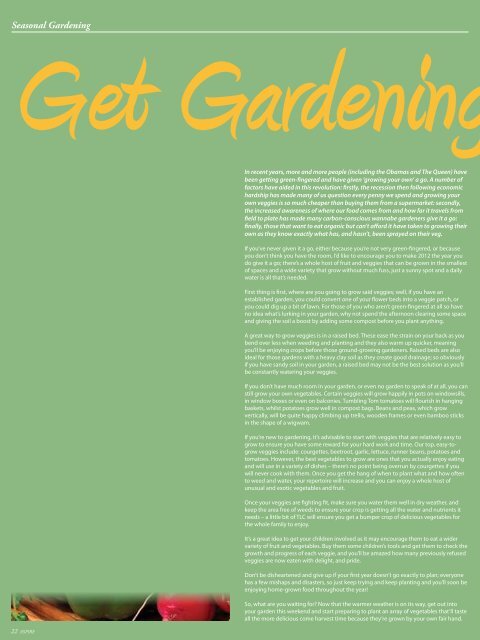Oadby Town Football Club - Aspire Magazine
Oadby Town Football Club - Aspire Magazine
Oadby Town Football Club - Aspire Magazine
You also want an ePaper? Increase the reach of your titles
YUMPU automatically turns print PDFs into web optimized ePapers that Google loves.
Seasonal Gardening<br />
In recent years, more and more people (including the Obamas and The Queen) have<br />
been getting green-fingered and have given ‘growing your own’ a go. A number of<br />
factors have aided in this revolution: firstly, the recession then following economic<br />
hardship has made many of us question every penny we spend and growing your<br />
own veggies is so much cheaper than buying them from a supermarket: secondly,<br />
the increased awareness of where our food comes from and how far it travels from<br />
field to plate has made many carbon-conscious wannabe gardeners give it a go:<br />
finally, those that want to eat organic but can’t afford it have taken to growing their<br />
own as they know exactly what has, and hasn’t, been sprayed on their veg.<br />
If you’ve never given it a go, either because you’re not very green-fingered, or because<br />
you don’t think you have the room, I’d like to encourage you to make 2012 the year you<br />
do give it a go; there’s a whole host of fruit and veggies that can be grown in the smallest<br />
of spaces and a wide variety that grow without much fuss, just a sunny spot and a daily<br />
water is all that’s needed.<br />
First thing is first, where are you going to grow said veggies; well, if you have an<br />
established garden, you could convert one of your flower beds into a veggie patch, or<br />
you could dig up a bit of lawn. For those of you who aren’t green-fingered at all so have<br />
no idea what’s lurking in your garden, why not spend the afternoon clearing some space<br />
and giving the soil a boost by adding some compost before you plant anything.<br />
A great way to grow veggies is in a raised bed. These ease the strain on your back as you<br />
bend over less when weeding and planting and they also warm up quicker, meaning<br />
you’ll be enjoying crops before those ground-growing gardeners. Raised beds are also<br />
ideal for those gardens with a heavy clay soil as they create good drainage; so obviously<br />
if you have sandy soil in your garden, a raised bed may not be the best solution as you’ll<br />
be constantly watering your veggies.<br />
If you don’t have much room in your garden, or even no garden to speak of at all, you can<br />
still grow your own vegetables. Certain veggies will grow happily in pots on windowsills,<br />
in window boxes or even on balconies. Tumbling Tom tomatoes will flourish in hanging<br />
baskets, whilst potatoes grow well in compost bags. Beans and peas, which grow<br />
vertically, will be quite happy climbing up trellis, wooden frames or even bamboo sticks<br />
in the shape of a wigwam.<br />
If you’re new to gardening, it’s advisable to start with veggies that are relatively easy to<br />
grow to ensure you have some reward for your hard work and time. Our top, easy-togrow<br />
veggies include: courgettes, beetroot, garlic, lettuce, runner beans, potatoes and<br />
tomatoes. However, the best vegetables to grow are ones that you actually enjoy eating<br />
and will use in a variety of dishes – there’s no point being overrun by courgettes if you<br />
will never cook with them. Once you get the hang of when to plant what and how often<br />
to weed and water, your repertoire will increase and you can enjoy a whole host of<br />
unusual and exotic vegetables and fruit.<br />
Once your veggies are fighting fit, make sure you water them well in dry weather, and<br />
keep the area free of weeds to ensure your crop is getting all the water and nutrients it<br />
needs – a little bit of TLC will ensure you get a bumper crop of delicious vegetables for<br />
the whole family to enjoy.<br />
It’s a great idea to get your children involved as it may encourage them to eat a wider<br />
variety of fruit and vegetables. Buy them some children’s tools and get them to check the<br />
growth and progress of each veggie, and you’ll be amazed how many previously refused<br />
veggies are now eaten with delight, and pride.<br />
Don’t be disheartened and give up if your first year doesn’t go exactly to plan; everyone<br />
has a few mishaps and disasters, so just keep trying and keep planting and you’ll soon be<br />
enjoying home-grown food throughout the year!<br />
Get Gardening… Then Cooking<br />
A Beginners’ Guide To Garden Tools<br />
You don’t need to spend hundreds of pounds on<br />
the latest high-tech equipment, but there are a few<br />
essentials every gardener needs…<br />
• Spade – essential for digging, good spades<br />
can break and move soil efficiently.<br />
• Fork – potentially more useful than spades<br />
when clearing new ground and breaking firm soil.<br />
• Rake – you’ll need to level your soil once it’s been dug and<br />
that’s when you’ll need this little piece of kit.<br />
• Hoe – best used for chopping heads off annual weeds, a<br />
hoe can make light work of weeding; make sure you<br />
hoe on hot and dry days so weeds don’t re-root.<br />
• Trowel – an invaluable digging tool, a trowel is<br />
ideal for planting and weeding; use the pointed<br />
end to make furrows when seed sowing.<br />
• Shears – ideal for keeping plants and bushes under<br />
control, as well as keeping your lawn edges looking neat<br />
and tidy.<br />
• String – it may seem primitive, but tying a length of string<br />
to two sticks enables you to plant/sow in straight lines.<br />
by Laura Hyde<br />
What to Plant This Month:<br />
As we’re now into late winter, the ground<br />
is still hard with frost so planting should<br />
be reserved to the greenhouse, indoor<br />
window sills or mild areas – ensure to<br />
protect any outdoor seedlings with<br />
cloches.<br />
• Bulb Onions<br />
• Lettuce<br />
• Beetroot<br />
• Spinach<br />
• Carrots<br />
• Early Peas<br />
• Broad Beans<br />
So, what are you waiting for? Now that the warmer weather is on its way, get out into<br />
your garden this weekend and start preparing to plant an array of vegetables that’ll taste<br />
all the more delicious come harvest time because they’re grown by your own fair hand.<br />
For more information about growing and eating seasonally, visit eatseasonably.co.uk<br />
22 ASPIRE<br />
ASPIRE 23

















